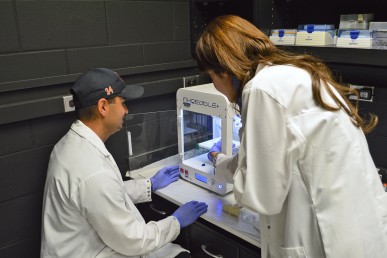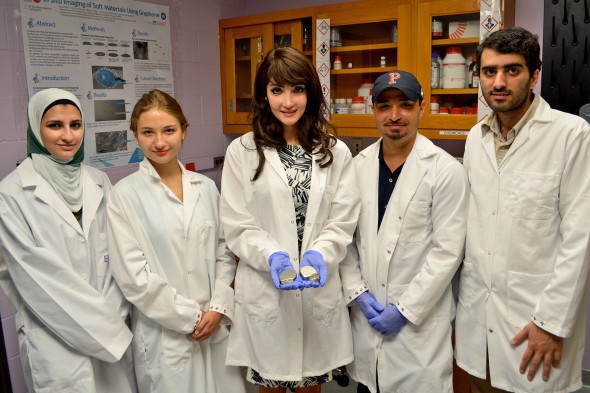5-year NIH funded project bolsters CPS science teaching
When students walk into Vyjayanti Joshi’s biology classes at Lake View High School on the North Side in a few weeks, the veteran science teacher will be ready to share what she learned about nanomedicine this summer at the University of Illinois at Chicago.
Joshi is among the latest group of Chicago Public Schools teachers taking part in a five-year project that takes high school pre-engineering and science teachers and provides them with a six-week opportunity to work in bioengineering research labs and to use the experience to create lessons for their students.
“The cool thing is that I do have a two-to-three week unit planned out, but I will also have multiple opportunities throughout the school year to teach some of the lab techniques that I have learned,” says Joshi. “What I hoped to get out of the program is for my own professional growth to be up to date with the current research techniques and to experience authentic research in a real lab and then be able to take my learning back to my students.”
The program, Bioengineering Experience for Science Teachers or BEST, is in the second of a five-year cycle funded by a $500,000 grant by the National Institute of Biomedical Imaging and Bioengineering of the National Institutes of Health. The program focuses exclusively on Chicago Public Schools teachers to help prepare them to teach diverse student populations.
The collaboration between the colleges of engineering and education takes eight applicants a year and provides them with an $8,000 stipend and an additional $1,000 for classroom supplies.
The program is the brainchild of Jennifer Olson, clinical assistant professor of curriculum and instruction in the College of Education, and Miiri Kotche, a clinical associate professor of bioengineering in the College of Engineering.

Valentin Torres, BEST Teacher Fellow Summer 2016 and teacher at Walter Payton High School (Left) and Dr. Tolou Shokuhfar (Right).
“My hope is that we can ultimately increase awareness of what bioengineering and what engineering is and ultimately to increase the pipeline of students into engineering curriculums and to grow engineers,” said Kotche.
Olson, who had been a CPS teacher for 10 years, said the cross-discipline aspect provides teachers with opportunities to learn from more than a dozen bioengineering faculty mentors at UIC and work with education experts to tailor classroom curricula.
During the six weeks, the teachers work with lab experts and then spend a day collaborating with other teachers. Teachers have completed lessons on waves and medical imaging, the nervous system, the respiratory system and other projects, which are available for other teachers to use here.
In addition, each CPS teacher undergoes a six month assessment to evaluate the efficacy of their lessons.
“This unique partnership provides a key opportunity for our high school science teachers to bring lessons from state-of-the art lab technology into the classroom,” said LaTanya McDade, chief of teaching and learning at Chicago Public Schools. “By collaborating with UIC, we’re providing dedicated science teachers with an unparalleled research opportunity which will result in hands-on, innovative lessons for Chicago’s students.”
This Friday, Aug. 4 the BEST teacher fellows will present their lab experience and an overview of their curricula. The summer 2017 BEST final presentations will take place at 1040 W. Harrison St., Room 2217. [Media who would like to attend should RSVP at https://goo.gl/forms/lrO2hmCWYUWBX0bH3.]

